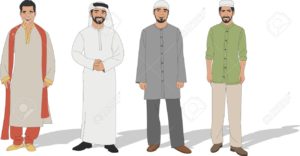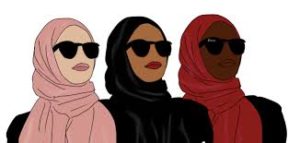For years now, I know you’ve probably heard, “Men are supposed to do this, women are supposed to do that”. These words are something that was taught from a young age to all boys and girls from generation to generation. Until this day, you could still experience this from your parents or the adults around you. Being born into the Islamic religion, I was taught the things that women “ should do” and what the men social norms are such as having certain jobs. However, in our society today, both men and women are entitled to do anything that pleases them. A young adult, I have witnessed how changes in the roles that embedded in young Muslim children have started to change over time. As the role for both Muslim men and women has changed due to the different generations of society and throughout those generations the society has changed every year in the aspects of clothing and jobs.


Growing up in a Western, Non- Muslim society was difficult. Seeing how my elders were dressed compared to the dress code of America was different and I didn’tknow how to follow both. Being born and raised in America, I was surrounded by different beliefs and cultures so I couldn’t identify how I should dress.“ When you grow up. soon you’ll be also wearing this dress everyday of your life. It shows modesty and covers you up”. I still remember these exact words from my aunt when I was a child. I was seven-years old, I was getting ready to go outside to play with some friends wearing a tank top and capris. My aunt said to my mother why am I going outside dressed like that and my mother responded she’s just a child and it’s summertime it’s warm out. My aunt responded that it doesn’t matter because once I get used to wearing exposing clothing, that I would grow up not wearing an Abaya ( The dress in Islamic term). That is when my aunt bend down to me and those words. Being exposed to the proper dress code of a Muslim women when I was young, gave me the mindset that when I get older I have to wear this type of clothing or else I wouldn’t be following the “role” of a Muslim woman. As I got older, I realized that I can wear modest and covered up clothing without wearing the Abaya. Throughout those years, I recognized that not every Muslim woman wore an Abaya and that didn’t mean that they questioned their religion, it just means that they are adjusting to the changes in their environment while still holding the name of how a Muslim women should dress. Same thing goes for the headscarf called the “hijab”. A Hijab is a head covering worn in public by some Muslim women.Just because you’re a Muslim women that doesn’t mean it mandatory to wear the hijab, it just goes with the look of the modest women. “Head/hair covering has been described in this paper as a “hot topic”—this applies to both Muslim and Jewish women. In the case of women’s head-covering, it appears that women are aware that their identity and many associated beliefs and behaviors are contingent on decisions made about specific aspects of religious practice, and head/hair covering is one such specific aspect, crucial in predicting key features of the woman’s religious trajectory. A young Jewish or Muslim woman who decides that she is going to cover her hair/head allows those who know her to infer that religion and spirituality are central and salient features of her identity ”( Loewenthal 167) . Just because you don’t wear the exact clothing of your religion doesn’t mean you can’t wear something similar to it. The clothing style of a Muslim women has changed overtime due to society. Depending on which country you’re in, you can see how in some countries the Muslim women clothing style has changed from wearing the long dress to something that covers up or is adapting to what they see in their environment. For example, many young Muslim women my age are now wearing jeans which wasn’t something that Muslim women wore without the long dresses. Usually jeans placed under your dress once the weather gets cold, but now many wear the jeans without the dress. I can also say that it was because of the people you see around you in that particular country that has a huge effect on what you should wear.
“ These new roles were seen by some as countering traditional Islamic belief, namely, that men have the primary religious duty to support the family and women have the duty to nurture the family at home” (Haddad pp.X). Many of the Muslim parents believed that the men should be the people working, providing for the wife and kids at home. This way of thinking puts a pressure on the men because it makes them believe that if they don’t have a stable and good paying job, that will mean that their family would suffer because of it. The woman was told to stay at home and provide for the children and keep the family together. This way of thinking started to change during World War II when women began to help in the war as nurses and educators. “Change did occur. Educational reforms improved literacy and opened up new opportunities for women, who became more visible in public life, in government, and in the professions. However, many questions remained. How deep and representative were these changes? To what extent were the primary beneficiaries of modern reforms a very small minority of urban elite women of the upper classes and upper middle classes? To what extent had reforms substantively changed gender relations—that is, the definition of gender roles and the status of women—in society in terms of authority and decision making? In other words, to what extent had modern reforms trickled down and across society, rather than remaining a testimony to the social and economic cleavages or gaps (which, ironically, often seemed to be the product of modernization programs in which a minority benefited from advances of the new order to a disproportionate extent).In more recent years, the “project of modernity” has seemed under assault—some would say discredited—as the nationalist and secular idioms have been challenged by the reassertion of Islamic alternatives”. In non dominated Muslim societies and even in dominated Muslim societies, the jobs for both men and women in the Islamic religion has evolved because you can do any job that pleases you in any society. Your job is something that you choose not because someone told you that you have to do a certain job because of your gender.
I believe a solution to this issue is to have a educated Muslim scholar that can explain to the older Muslim adults that there are going to be changes to the younger Muslim generations because of the particular country that we grew up in. This speaker would go in Mosques, speak on social media platforms, and in the community where many Muslims live, to explain to the elders that it is okay that change is happening around us but, it is up to them to continue teaching us further about the religion and why we do certain things in our Islamic religion. Two things the scholar would explain first is the clothing and job changes because those are the topics that are well rounded that most Muslims speak upon. The scholar should be influencing the changes and stating that its okay that change is happening around. By doing this the elders would adapt to this new environment and try to do their best to accommodate to their surroundings.
Works Cited● Abdullah Yusuf Ali. The Holy Quran. Surah An-Nisa. Vol 4https://www.quran411.com/( Historical Content)●Loewenthal, Kate Miriam; Solaim, Lamis S. Religious Identity, Challenge, and Clothing: Women Head and Hair Covering in Islam and Judaism. Journal of Empirical Theology.2016. Vol 29 Issue 2 (e.g.., pp 1-8)https://web-b-ebscohost-com.ccny-proxy1.libr.ccny.cuny.edu/ehost/detail/detail?vid=14&sid=f2be0191-2c7a-4529-bcdb-6faa067f390e%40pdc-v-sessmgr03&bdata=JnNpdGU9ZWhvc3QtbGl2ZQ%3d%3d#db=a9h&AN=120096843●Haddad, Yvonne Yazbeck; Esposito, John L. Islam, Gender, and Social Change. NewYork: Oxford University Press 1998. (e.g..,X)https://web-a-ebscohost-com.ccny-proxy1.libr.ccny.cuny.edu/ehost/ebookviewer/ebook/ZTAwMHhuYV9fMjM1MzNfX0FO0?sid=782537b3-9114-4bc3-b3bb-34070dedca01@sessionmgr4007&vid=5&format=EB&rid=5
125%
3 / 5

This entry is licensed under a Creative Commons Attribution-NonCommercial-ShareAlike 4.0 International license.

